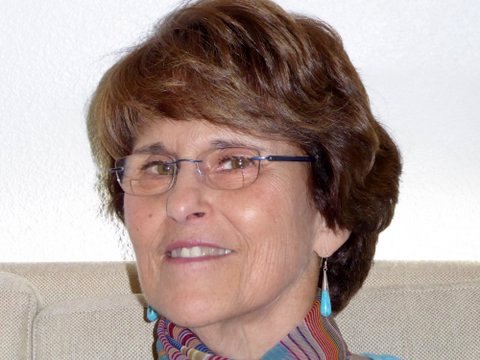BIO
Judy Kronenfeld is the author of five collections of poetry, most recently, Shimmer (WordTech Editions, 2012) and the second edition of Light Lowering in Diminished Sevenths, (Antrim House, 2012), winner of the 2007 Litchfield Review Poetry Book Prize. She has also published a critical study, King Lear and the Naked Truth (Duke, 1998). Her poems have appeared widely in print and online journals and in eighteen anthologies. She is Lecturer Emerita, Creative Writing Department, UC Riverside, and an Associate Editor of Poemeleon.
.
Values
My mother’s couch was nouveau middle-class
“Italian provincial antique white and deluxe gold
brocade,” immobilized in thick, glossy
plastic that stuck to your thighs in summer
and made you sweat; you peeled yourself
off it, dripping, and it screeked.
Achieved after decades of forlorn
second-hand, in her late
middle-age, after I left home—
the couch of someone who had waited
dusty years for it, and knew that time
would never grant such a one again,
the gift that never stopped giving,
new each morning, the plastic glinting—
it remained on display in my parents’
one-bedroom New York apartment
like a never-eaten white-gold passion-
fruit genoise under a clear cake
dome.
And if it was a shrine, a symbol, the butt
of exasperated jokes, and only in winter,
a bearable place to sit (when your legs
were protected by thick pants
or skirts), and, even then, your purchase
was sketchy, you felt you might
slide off, so what?
When we flew East for the visit
my mother had long sought,
her small grandson, exhausted
by the trip and the heat,
was put down for the night
on that couch—which she’d covered
with crisp sheets. She closed the Venetian
blinds, and we were all shushed.
He squirmed as we spoke in whispers—
my husband and I on the humble
guest hide-abed, my folks
on two dining chairs turned toward us—
then, thumb in mouth, nestled in,
rump up, legs tucked under, sheets bunching
under his round pot. A half-hour
later, he was on the floor, bawling,
though unhurt, having slid
off that couch on the water-slide
slick it secreted.
My mother rushed over, brushed back
the curls that plastered his glistening
forehead, kissed his bright red cheek
and said: “I’m stripping the couch-cover off.”
We tried and tried to dissuade her,
suggested a pallet on the floor. But
no go. Bleary-eyed, our son sat on the rug,
while we helped with the divestment—
feeling oddly depleted, as when something
you thought you dearly wanted fails
to bring joy. New sheets were spread,
our boy put down in thick briefs.
An hour later, when, again, he woke,
the not unexpected yellow blush,
the baptized white brocade.
Bubbele! my mother cried,
and pressed her sopping grandson to her,
as if he’d accomplished something
great.
.
Paid Work
With a wave like a flag’s
over Yankee stadium, my young mother runs
down our Bronx street toward the subway
and her new job in a Manhattan doll
factory, as I set out for school, apartment key
hanging from my neck on a bright ribbon
she gave me, scuffing the shoes she polished
against the sidewalk. All day she will stuff
gray kapok into the cloth arms,
legs and torsos of pale pink baby-dolls,
and breathe in rag dust in the fluorescent-lit
perpetual dusk of the grime-windowed loft,
and yack with the “girls” over the clackety-hum
of the sewing machines until the boss squawks
about the output.
At lunch, she descends
in the accordion-gated open-sided lift
into the blaze of the honking Manhattan street
stampeded by busy-ness moving west and east—
boys running wheeled racks of tuxedos
and overcoats; secretaries and shoppers
wearing veiled fascinators, feathered toques,
clicking by in sling-back sandals and two-tone
spectator pumps. A hurried pastry
and coffee at the counter of the luncheonette,
while the boss’s bookkeeper wife—adorned
with her little heads and feet
of mink—dines on salami
and eggs at the deli, and mom is back
on the floor until time to rush
home again, and, when weary dad
arrives, gaily suggest dinner at the 161st Street
cafeteria for the three of us.
Sixty years on, I read in the LA Times
about Mukhta Mollah and Kanchi Hazi,
who skim like breezes over the rubbled streets
six days a week in their pristine shalwar kameezes,
on their way to eight hours sewing blouses
in the glare and din of Beauty Garments Private,
Limited, Dhaka, Bangladesh, and proudly send
half of their tiny salaries home
to their natal families—in villages
where mothers-in-law tyrannize
their younger sisters.
And I remember my mother,
in 1953, her eye aglint
with that fresh sense of entitlement.
Astonished Shoes
From the hospital window
the sky is a wistful blue,
and two purely pink contrails
looped lazily into it
begin to fuzz out.
The mild breeze
whips snow-pears on the balcony
into frothing bowls
of bloom, parachutes billowing
down to safe landing, billowing
down. While, here,
in her stricken room—
where the jagged light jolts
as if a mirrored door
had just slammed shut—
when the therapist attempts
to stand her up,
my good friend pees
on his astonished shoes,
then crumples in a heap.
*****
44 total views , 1 views today

